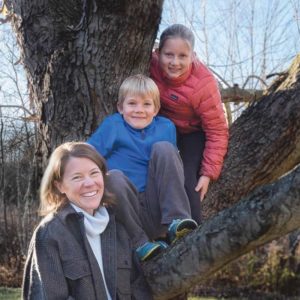![]() PelotonPosts is a monthly interview with a member of PelotonLabs, a co-working space in Portland’s West End with a mission to connect and encourage people stepping out of traditional modes of employment. This month, Peloton’s founder Liz Trice caught up with Marjie Longshore, the Director of the Family Leadership Center which offers parenting coaching and workshops.
PelotonPosts is a monthly interview with a member of PelotonLabs, a co-working space in Portland’s West End with a mission to connect and encourage people stepping out of traditional modes of employment. This month, Peloton’s founder Liz Trice caught up with Marjie Longshore, the Director of the Family Leadership Center which offers parenting coaching and workshops.
How did you get into this line of work?
 I have been intrigued by families since I was a kid and read my first parenting book when I was nine. I got my master’s in education, and I worked in adult development and school design. When I had kids, I tried to find fun workshops on parenting, and there weren’t any. I moved to Washington DC, and I found a group called the Parent Encouragement Program, went through all of their classes, and became one of their leaders. I taught in some American Schools in Ecuador, and in Brazil, and now there are groups around the world. I’ve taught around the US and will be in Germany this summer.
I have been intrigued by families since I was a kid and read my first parenting book when I was nine. I got my master’s in education, and I worked in adult development and school design. When I had kids, I tried to find fun workshops on parenting, and there weren’t any. I moved to Washington DC, and I found a group called the Parent Encouragement Program, went through all of their classes, and became one of their leaders. I taught in some American Schools in Ecuador, and in Brazil, and now there are groups around the world. I’ve taught around the US and will be in Germany this summer.
What’s special about your theory of parenting?
It’s a model of healthy parents wanting to grow themselves. If we can each focus on being better, we can have fun and work together and get stuff done. We are dedicated to supporting families in growing their democratic parenting skills: listening, sharing, connecting, and working together. This is a model of parents helping parents based on work by Alfred Adler. Parents have the opportunity to learn and practice the skills we teach, and they can become the teachers of Family Leadership Center, too.
What happens in the workshops?
I’ll present an idea and then we look at these things from lots of different perspectives and build a toolbox and try out the tools and discuss it. For example, we might have a workshop on handling morning mayhem, or helping your kids with chores, or with anxiety. What helps parents is to realize that we all have core needs, and when those needs are met, troubling behavior often disappears. Often, a parent says, “I have a need for this to happen,” to meet their own needs. Or a parent says, “Do whatever you want,” but our model takes everyone’s needs into account. We all need to be dressed, have food, and move forward our day, and we all need respect, so how do we work together so everyone gets their needs met?
What are the basic needs that everyone has?
Four core needs are:
1.To Belong. How do I connect? Do I feel like I only belong only if I’m being good, or if I’m getting good grades, or if I’m getting attention?
- To feel that I’m improving. How do we help our kids feel capable and give them chances to get better? A lot of the time when you get into power struggles it’s because kids don’t feel capable, and when they’re not getting a chance to struggle to improve in their own lives, they’ll struggle with the parent instead.
- To feel significant. We need to know that we matter. If I like green beans, and we never get to eat green beans, what’s up with that? We teach people how to have family meetings, and we build in games so that we learn how to really listen to each other and work with each other.
- The last thing that we need is encouragement. We need courage in life. How do you build your family so that it’s encouraging? How do we learn to make it through when something sad happens?
Can you give an example of how this work might help a family?
One example is of a family where the parents were thinking of getting divorced. The family had a good habit of having family meetings, and kept having those meetings, and it created this amazing space where the kids felt safe, because they were being told what might impact them. It allowed the family to move as a team, and the kids ended up developing more courage, just by knowing that the family was able to work through this problem as a team.
Another example: it takes away kids sense of significance when we pay them for chores or grades. They get a natural sense of well-being by helping someone else, and by doing a good job. When we make it just about money or affirmation from a parent it takes away from that intrinsic reward.
 PelotonLabs
PelotonLabs
Peloton Memberships starting at $30/month include free access on a limited basis to John’s coaching hours. Visit http://pelotonlabsportland.com for more information on membership.





